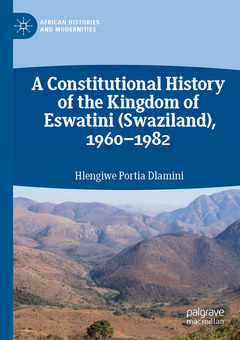A Constitutional History of the Kingdom of Eswatini (Swaziland), 1960–1982, 1st ed. 2019 African Histories and Modernities Series
Langue : Anglais
Auteur : Dlamini Hlengiwe Portia

Swaziland?recently renamed Eswatini?is the only nation-state in Africa with a functioning indigenous political system. Elsewhere on the continent, most departing colonial administrators were succeeded by Western-educated elites. In Swaziland, traditional Swazi leaders managed to establish an absolute monarchy instead, qualified by the author as benevolent and people-centred, a system which they have successfully defended from competing political forces since the 1970s. This book is the first to study the constitutional history of this monarchy. It examines its origins in the colonial era, the financial support it received from white settlers and apartheid South Africa, and the challenges it faced from political parties and the judiciary, before King Sobhuza II finally consolidated power in 1978 with an auto-coup d?état. As Hlengiwe Dlamini shows, the history of constitution-making in Swaziland is rich, complex, and full of overlooked insight for historians of Africa.
1. Introduction.- 2. The Major Players in the Making of Swaziland's (Eswatini's) Independence Constitution.- 3. The Beginning of the Great Constitutional Debate: Agreeing to Disagree.- 4. The Imposed 1963 Constitution, the Maiden Legislative and Executive Councils and the Select Constitutional Committee.- 5. The 1967 Constitution, Internal Self-Government, and the 1968 Independence Constitution.- 6. The 1968 Westminster Constitution, the 1972 General Election, and Serious Challenges Confronting Constitutional Monarchism.- 7. From King Sobhuza II's Auto-Coup D'état to the Era of a Constitutional Vacuum and Royal Benevolent Despotism.- 8. Conclusion.
Hlengiwe Portia Dlamini is a postdoctoral fellow in the International Studies Group at the University of the Free State, Bloemfontein, South Africa. She received her PhD from the University of Pretoria, South Africa, and her research interests include the governance of public space, community policing, the enfranchisement of women, and Islamic minorities in Swaziland.
Offers the first constitutional history of Swaziland (Eswatini) Examines the alliance between King Sobhuza and apartheid South Africa and the role it played in shoring up the monarchical system Foregrounds the struggle for power between monarchists and progressive, Western-educated elites
Date de parution : 10-2020
Ouvrage de 366 p.
14.8x21 cm
Date de parution : 10-2019
Ouvrage de 366 p.
14.8x21 cm
Thèmes d’A Constitutional History of the Kingdom of Eswatini... :
© 2024 LAVOISIER S.A.S.



